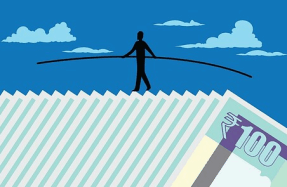NYAY: Will Rahul Gandhi's minimum income guarantee scheme prove to be Congress's trump card?

It was a chilly winter evening in 2016. India was debating demonetisation while Uttar Pradesh-electorally the most significant state in the country-was gearing up for assembly election a few months away.
Congress president Rahul Gandhi had just returned from the state after "witnessing people's hardships" because of the Narendra Modi government's decision to render two high-value currency notes illegal. He called some of his party's top leaders and asked them what they thought of the feasibility of a direct cash transfer scheme to ensure a minimum income for India's poor.
A little over two years later, the Congress has not only firmed up this idea, but also offered it as its biggest promise ahead of the 2019 Lok Sabha election. On March 25, Rahul announced that if voted to power at the Centre, a Congress government would unconditionally give 20 per cent of the country's poorest of poor households a sum of Rs 72,000 annually or Rs 6,000 every month. He claimed the Congress's Nyuntam Aay Yojana (NYAY), or minimum income guarantee (MIG) scheme, would benefit 50 million households or approximately 250 million people (assuming five members per family).
Given its scale and scope, NYAY is arguably the most ambitious and encompassing social welfare programme ever announced-if only as a campaign manifesto. Going by plain arithmetic, NYAY will cost the exchequer Rs 3.6 lakh crore a year-1.8 per cent of India's GDP. Announced just 17 days before the first phase of voting, NYAY might prove to be the election game-changer.
In the see-saw struggle to 'control the narrative', Rahul has won this round. Last December, the Congress defeated the BJP in the Hindi heartland states of Rajasthan, Madhya Pradesh and Chhattisgarh. Buoyed by the victories, the party raised the pitch against Prime Minister Modi on the issues of unemployment and the agrarian crisis, forcing the Union government to up the ante with economic populism-announcements such as 10 per cent reservation for upper caste poor in jobs and education and a Rs 6,000 a year dole for small and marginal farmers under the PM Kisan Samman Nidhi Yojana.
Then, Pulwama happened. The massacre of 40 paramilitary troopers in a suicide attack on February 14 and India's subsequent air strike in Pakistan's Balakot shifted the mood of the nation and the public conversation to patriotism and national security, allowing Modi to regain the upper hand.
As the BJP sought votes in the name of the Balakot
You’re reading a preview, subscribe to read more.
Start your free 30 days



